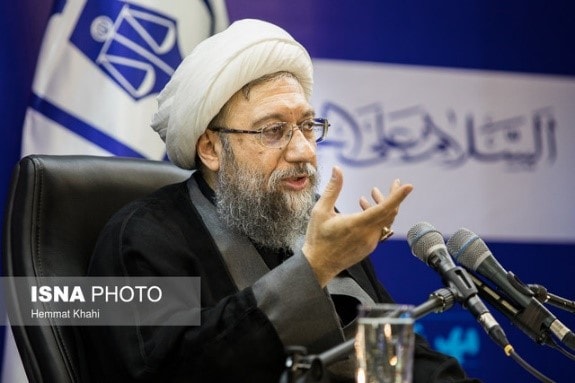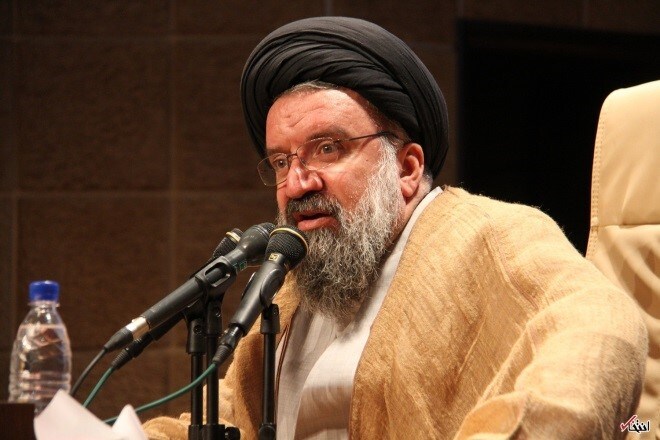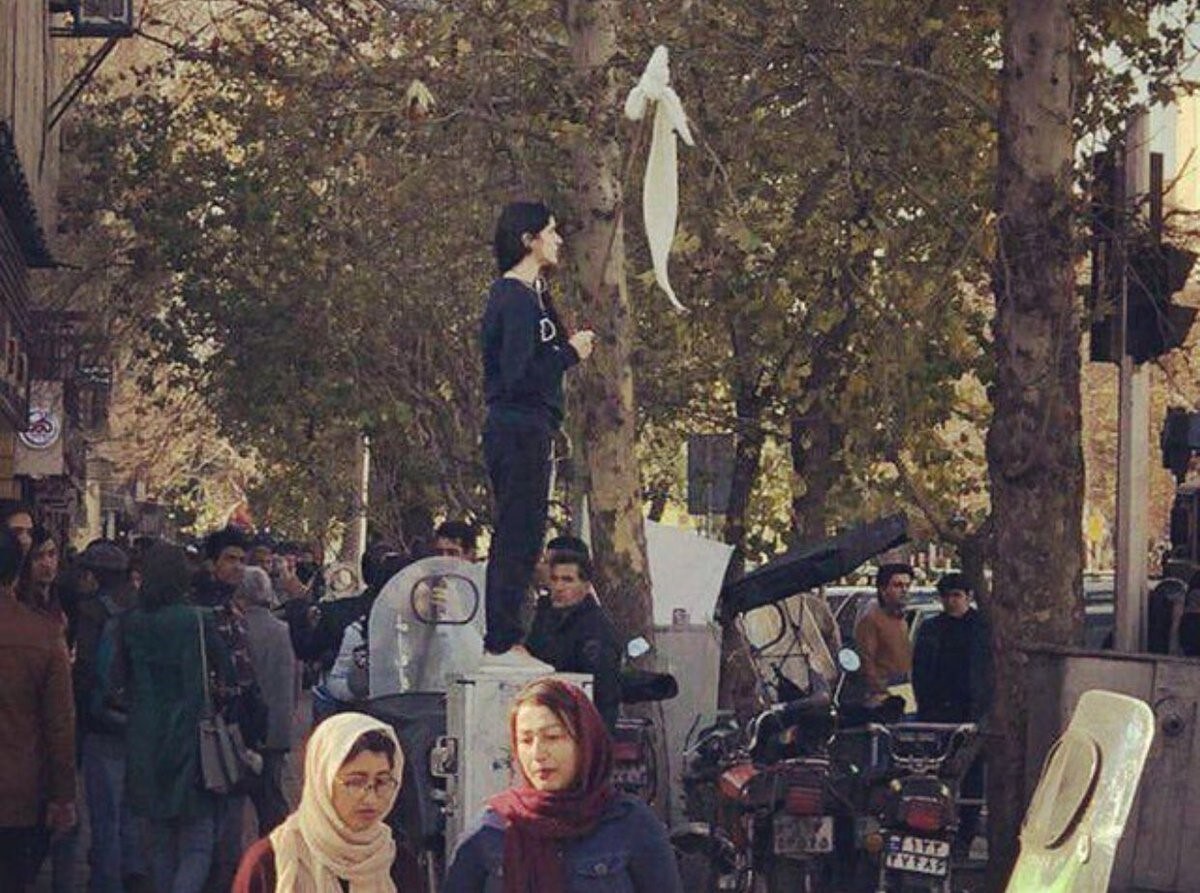In the wake of the widespread December 2017 and January 2018 social and political protests against the regime in Iran, in which the women's protest against the mandatory Islamic dress code – the hijab – was conspicuous, senior regime ayatollahs have stressed the crucial importance of enforcing the hijab law. In a speech on International Women's Day (March 8, 2018), which coincides with the Iranian Mother's Day, Iran's Supreme Leader Ali Khamenei stated that the hijab confers moral superiority upon Muslim women, compared to their sisters in the West, especially in light of the complaints of sexual harassment by women in the West, as reflected in the #MeToo campaign. He stressed that the hijab protects women and does not limit them. Khamenei rejects the Western perception that women are equal to men and opposes allowing them to choose whether to wear the hijab, saying that it is compulsory. The head of the Iranian judiciary, Ayatollah Amoli Larijani, claimed that not wearing the hijab leads to the spread of prostitution, and police and security officials in Teheran ordered that the Islamic dress code for women be enforced.
This report presents the main statements made by Iranian regime ayatollahs in favor of enforcing the hijab law.
Supreme Leader Khamenei: The Islamic Hijab Protects Rather Than Restricts Women
In a speech delivered on March 8, 2018, Supreme Leader Khamenei compared the status of women in West to their status in Islam, saying: "In contrast to the Islamic model stands the deviant model of the Western woman. Instead of all the outstanding, excellent characteristics of the Islamic woman, [the Western woman] has characteristics such as nudity and attraction of the attention and the desire of men. Today the Western woman stands for the use of cosmetics and the attraction of men; she is a tool for sexual release. Notions such as sexual respectability in Western rhetoric are purely for the sake of appearances and contain not a shred of truth. In recent months, many Western women of status have complained about [sexual] exploitation and violence in the workplace. With the hijab, Islam closes the door on this perversion. Thus, the Islamic hijab is a means that protects the woman, not one that restricts her.
"Iranian women project their essential and cultural independence to the world by upholding the hijab, and thus declare a new position: women can uphold the hijab and [the value of] modesty and prevent exploitation by strange men with excessive demands, and in that way can play an active and effective role in the social arena.
"I condemn those who humiliate the mainstay of the family [i.e. the woman] by claiming that sexual respectability means that in every sphere where men are present women should be present as well. That is a betrayal of women, of their honor and their identity. The woman is honored and no one objects to her presence in the social and to her [acquiring] educational and status. That is the beauty of the Islamic revolution: that the women of Iran now include outstanding scientists and cultural figures. Before the revolution things were different, and the number of women holding prominent positions in the spheres of science and culture was very small...
"They [the enemies] created a lot of propaganda and invested huge sums of money to negatively influence [the image of] the hijab. They invested much money, thought, and propaganda [just] so that some young girls would eventually be deceived and uncover their heads in all sorts of places. All their efforts yielded negligible results, which is not a problem at all. What vexes me is that some officials make statements such as 'the hijab is coercion'... These people claim that the Imam Khomeini's directive regarding the hijab does not apply to all women. I reject this claim, for it is wrong. I was [with Khomeini] and I know that the eminent Imam stood firm as a mountain and said that there is a need for the hijab...
"The Islamic regime takes no issue with a woman who doesn't wear the hijab in her home, or when meeting a stranger [in her home]. However, what is done in public influences the public. The regime that arose in accordance with Islam must confront this. If something is forbidden, it doesn't matter whether it is a small issue or a large one. What is forbidden according to religious law must not be done in public, because Islamic law and the regime have determined that forbidden acts in public must be prevented.
"I reject the claim made by some, that the people should be allowed to choose for themselves [whether to obey] the hijab [law]. Should we say the same about [all] social sins, and say, for example, that we will allow the sale of alcoholic drinks – and whoever wants to consume them will do so, and whoever doesn't want to will not consume them?
"We are proud of the hijab of the women of Iran. The Iranian woman, with the Islamic hijab and the Iranian chador, has managed to be a housewife and take care of her husband, and also to achieve the highest levels in science and culture and gain effective social presence. The desire of certain people to circumvent the law in order to create a mistaken and deviant aspiration based on Western culture is a great sin.
"Every transgression of the Islamic policy [of the regime] should be prevented, and those in charge must handle these issues and laws in a manner that conforms to the interests of Islam and not the objectives of the enemy...
"What kind of sexual decency is there in the West, when, according to the data that [the West itself provides], most cases of rape and the use of force and violence in Europe and America, including violence of men against women, take place within the family? In Islam, sexual respectability means respecting the woman, not raping her, and preventing violence against women in the family. To understand whether a particular act constitutes violence or not, one should apply logic and Islamic thinking, not the science of the West."[1]
Judiciary Head Ayatollah Amoli Larijani: Not Wearing The Hijab "Spreads Prostitution"
At a March 12, 2018 meeting of senior judicial officials, the head of the Iranian judiciary, Ayatollah Amoli Larijani, said: "It is very unfortunate that some in [our] Islamic regime and Islamic society doubt whether we should be concerned with [the phenomenon of] not wearing the hijab and whether it should be enforced. Beyond the fact that it is a positive commandment in Islam, it is also a public issue... The Islamic society and the Islamic regime [in Iran] must care about the spread of prostitution and prevent it. This is essential...
SUPPORT OUR WORK

"Those women who provocatively refrain from wearing the hijab are just like those who commit any other forbidden act. This effectively spreads prostitution. [Islamic] law explicitly commands to wear the hijab. [The practice] has its roots in law and in the shari'a, and nobody should question it. Some young people may err, but why do some senior officials [hinting at the Rohani government] repeat the words of the enemy?

Ayatollah Amoli Larijani (image: ISNA, Iran)
"Sometimes these people put forward very insolent arguments and say, 'Hold a referendum about this' [the reference is to President Rohani who called for a referendum with regard to social issues]. In fact,... they are saying that the Islamic regime was established on the basis of a referendum, and passed all sorts of laws in the framework of the religion. Now, [they say], hold a referendum to authorize or reject a forbidden act. So tomorrow they may also propose 'holding a referendum' to decide whether to sell alcoholic drinks, to hold wanton parties, to establish centers of corruption and prostitution, etc. These things are very wrong."[2]
Ayatollah Ahmad Khatami: The Hijab Is Essential, Like Prayer And Fasting. It Is A Religious Law In Islam
At a memorial conference for martyrs in Kerman Province on February 19, 2018, Ayatollah Ahmad Khatami, a member of the Assembly of Experts and a Friday preacher in Teheran, said: "If someone is not faithful to religion and prayer, or doesn't abide by the law of hijab, then his approach to religion is deceitful and he is trampling its laws. A so-called senior cleric said on a certain media channel that Islam doesn't regard the hijab as a requirement and never [actually] stated that women are required to cover themselves with the hijab.

Ayatollah Ahmad Khatami (image: Entekhab, Iran)
"Religion has laws. For example, the religion forbids young men to have inappropriate relations with a woman to whom they are not married, and if they do have [such relations] they must, according to the Quran, receive 100 lashes… The hijab is necessary, like prayer and fasting. This is the Islamic law. Anyone who makes light of it and makes claims of this sort [i.e., that the hijab is not mandatory] is ignorant of the very essence of religion. Religion is law, and it is essential [to abide by] every law and punishment.
"A woman is of value, and Islam wants a woman to be valued and wants her to protect her modesty and thus attain human status. In the West they have buried women in a situation that is worse than [the situation of women] during the jahiliyya [i.e., pre-Islamic period]. Islam does not want women to be tools or merchandise…
"A false approach to the family is that the parents are not responsible for their children's behavior or religious [observance] but only for supplying food and clothing… This is a very great sin, that someone should take a false approach to the religion."[3]
Ayatollah Makarem Shirazi: Women Uncover Their Head In Public, And This Is A Sin
Ayatollah Makarem Shirazi, also a Friday preacher in Teheran, said on February 27, 2018: "There are those who say that 'there is no coercion in Islam [Quran 2:256], so why should the hijab be compulsory?' These people are using the term 'compulsory' in an erroneous way, because in Islam some things are forbidden, such as the consumption of alcohol and drugs, stealing and usury, and [also] immodesty and not wearing the hijab. Sometimes people violate these [laws] in their homes, and in that case we are not spies. That is [their] private life and we don't need to interfere.
"There is no connection between neglecting the hijab and [interference in] people's private lives, because when it is done in front of everyone it becomes a public issue. It occurs in public and it is a sin. One cannot permit sins in society with all sorts of excuses, because if we permit this, it won't stop with the hijab and additional problems will arise…"
On the question of whether women can be bareheaded in their cars, Ayatollah Shirazi said, "The car cannot be a private place because it is like a house made of glass, it is in full view of the public. A private place is concealed from the public. Certain people – intentionally or unintentionally – try to permit things that are forbidden so as to weaken Iran… They say that there are more important issues to deal with than the hijab… [But the truth is that] all prohibitions must be enforced."[4]
Tehran Prosecutor-General Dolatabadi: We Ordered To Arrest Women Driving Without A Hijab
On March 8, 2018 (International Women's Day and Iranian Mother's Day), the prosecutor-general of the Revolutionary Courts in Tehran, Abbas Jafari Dolatabadi, declared, "I condemn turning the hijab into a political issue. This is part of the enemy's plot. The enemy is trying to present modesty and the hijab as issues over which women are fighting the Iranian [regime]…

Abbas Jafari Dolatabadi (image: Asriran, Iran)
"The Prosecutor-General's [office] in Tehran has ordered the police to continue handling violators of the hijab [law]. The police must fulfil its duty. I'm not saying police [intervention] is the only solution to the hijab [problem], but I believe that not adhering to the hijab [law] causes society to slide into violation of the religious laws. The Prosecutor-General's [office] in Tehran has officially ordered the arrest of bareheaded women drivers, in accordance with the religious law. According to police statistics, in the past two months 3,120 cars were stopped because [the driver] was not wearing a hijab [and for reasons of] women's harassment, loud noise, etc."[5]
Ayatollah Noori Hamedani: The Hijab Is Compulsory
On February 27, 2018, Ayatollah Noori Hamedani likewise said that "one of the obligations of Islam is the woman's hijab, and this is a moral issue that must be implemented. Those in charge, such as the government, must take steps to enforce the hijab and implement this in practice."[6]

Woman in Tehran protesting the hijab law (image:albawaba.com, January 20, 2018)




